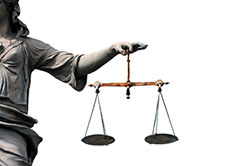 If you have been studying ILSPA’s Legal Secretaries Diploma course, you will already have a good understanding of the way in which the common law system of England came into existence. Our legal system – as well as other legal systems throughout the world, such as those in Australia, India and South Africa – is based on common law.
If you have been studying ILSPA’s Legal Secretaries Diploma course, you will already have a good understanding of the way in which the common law system of England came into existence. Our legal system – as well as other legal systems throughout the world, such as those in Australia, India and South Africa – is based on common law.
What is common law?
Common law basically means that the higher-ranking courts of our judiciary are able to make decisions in cases that will be binding on the courts below them. The Supreme Court is the highest court in this country, with the Court of Appeal and High Court following. All these courts are able to make decisions that will be binding on the Crown Courts, County Courts and Magistrates’ Courts below. At this point, it is important to mention the Brexit decision from June 2016. At the moment, and until the United Kingdom officially leaves the European Union, decisions made in the European Court of Justice (ECJ) are binding on this country. When we have left the EU, this will no longer be the case.
It is up to judges to decide on points of law and to decipher the legislation that has been passed by Parliament. This is especially helpful where areas of law are ambiguous and require a better explanation. However, there are some opponents of this system of law who believe that there is too much room for human emotion, opinion and error in this type of system.
Whether you are in favour of the English Common Law system or not, the fact is that many of our laws have originated by way of judges’ decisions over the years. From a massively heavy reliance on common law decisions to help define our current contract and tort laws to even the fact that murder is a crime due to a common law ruling, it has been such an important aspect of our legal system over the centuries.
Which countries are affected by common law?
Common law systems are in operation in countries where the British Empire once existed, with a couple for exceptions, as follows:
Antigua and Barbuda
Australia
Bahamas
Bangladesh
Barbados
Belize
Bhutan
British Virgin Islands
Canada
Cayman Islands
Cyprus
Dominica
Fiji
Gibraltar
Grenada
Hong Kong
India
Ireland
Israel
Jamaica
Kiribati
Myanmar
Nauru
New Zealand
Northern Ireland
Pakistan
Saint Kitts and Nevis
Saint Vincent and the Grenadines
Singapore
Tonga
Trinidad and Tobago
Tuvalu
Uganda
Common law systems affect the largest number of people in the world today, with civil law systems ranking in second place and statutory law and religious law systems following.
Even the United States of America has adopted the English Common Law system; however, given its definite French roots and history, the state of Louisiana adamantly refuses to do so and prefers instead to follow the Civil Law system. The biggest surprise has to be the fact that Scotland is actually closer to Europe than it is to England when it comes to the legal system it relies upon. However, Northern Ireland and Wales have followed the English model.
So, the next time you settle down to watch a gripping court room battle from across The Pond, or you hear a news bulletin that is reporting about a case from Pretoria, South Africa, you might like to spare a thought for the fact that it is due to the British Empire that these countries still rely on the Common Law system to this day.
The civil law system
Whilst the English Common Law system originated in this country, across the English Channel and even over Hadrian’s Wall, another system of law which was has been in operation for many centuries is the Civil Law system. Rather than judges making decisions that will be binding on lower-ranking courts, in civil law, there is an approach that is known as “inquisitorial” in nature. During a case, a judge is involved far more and actually investigates matters throughout.
Civil law systems are also present throughout the world and tend to be concentrated in regions that were colonised by our European neighbours.

